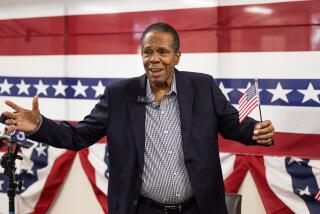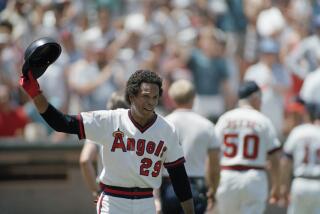One Year Later, Carew Remembers
- Share via
NEW YORK — His friends keep telling him he’ll get over the death of his daughter, but Angel batting instructor Rod Carew keeps asking himself when and how it will happen.
It was one year ago Thursday that Michelle Carew, the youngest of Rod and Marilynn Carew’s three daughters, succumbed to leukemia after a seven-month battle against the disease.
In the final moments before she died at Children’s Hospital of Orange County, Rod cradled Michelle, kissed her, and told her to “have a safe journey.” Michelle was 18.
“I try not to let it bother me, but there isn’t a minute that goes by when I don’t think about her,” Carew said. “She’s constantly there.”
Coincidentally, Carew will be with Michelle on the one-year anniversary of her death--the Angels begin a two-game series against the Minnesota Twins today in Minneapolis, where Michelle is buried.
Carew, a Hall of Fame infielder, played 12 of his 19 major league seasons at Minnesota. And it was on Sept. 10, 1995--after the Angels had lost a game to the Twins--that Marilynn Carew found Michelle slumped over a computer, complaining of blurred vision, back pains and a headache.
A few days later, Michelle was diagnosed with acute nonlymphocytic leukemia, one of the deadliest strains of the disease.
“I looked at the schedule when it came out and I couldn’t believe it,” Carew said. “I’m going to go to the cemetery and hang out with her both days we’re there.”
During the course of Michelle’s illness, Carew, who often avoided reporters and was hardly embraced by the media during his playing career, appeared on national television programs, granted in-depth newspaper interviews and even wrote to syndicated columnist Abigail Van Buren in an effort to find a potential bone-marrow transplant donor to match his daughter.
More than 70,000 calls to the National Marrow Donor Program--based in Minneapolis--were generated by publicity from Michelle Carew, and the donor registry increased from 1.5 million to 2 million in about six months.
But Carew’s efforts to raise awareness of the marrow donor program did not end with Michelle’s death. After returning to work last May, Carew attended luncheons in almost every city the Angels played, asking corporations to get involved with the marrow program, and he continued talking to reporters.
Last September, he spoke before Congress on behalf of young cancer patients. About a month later, Congress appropriated $50 million for pediatric cancer research.
“I was listening to the radio in my car when I heard the news, and I opened the window, looked up and said, ‘Thanks, Pish,’ ” Carew said, using Michelle’s nickname. “She’s still helping people even though she’s not there.”
Carew has found that it helps talking to Michelle, and at times he has gone into Michelle’s room in their Anaheim Hills home, sat on her bed and spoken to her.
“The hardest part is walking in the house every day and this smiling, happy-go-lucky girl is not there,” Carew said. “It’s just a void.”
More to Read
Go beyond the scoreboard
Get the latest on L.A.'s teams in the daily Sports Report newsletter.
You may occasionally receive promotional content from the Los Angeles Times.






